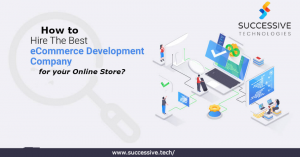In today's digital era, the landscape of e-commerce is fiercely competitive and ever-changing. Establishing a successful online store requires more than just a compelling product range; it necessitates a robust toolkit that addresses various aspects of the digital selling process. From seamless store management to advanced analytics, leveraging the right e-commerce tools can be the defining factor in an online brand's success. In this article, we will explore the must-have tools every e-commerce brand needs to optimize operations, enhance customer experience, and grow their business.
Essential E-Commerce Tools for Optimizing Your Online Store

An optimized e-commerce platform is essential for smooth online retail operations. Platforms like Shopify or WooCommerce streamline product management and customer service, while tools like Magento and Squarespace enhance website design and user experience. Ensuring your site is mobile-friendly is crucial, as more shoppers use smartphones.
Efficient inventory management software helps avoid stock issues and automates reordering, saving time and reducing errors. Secure payment gateways like PayPal and Stripe support seamless transactions, and tools such as SafeOpt can boost customer engagement by automating follow-ups and confirmations.
Streamlining Order Fulfillment and Shipping with Advanced Software
Once a sale is made, efficient order fulfillment becomes critical. Automated software helps by syncing with inventory systems to generate packing slips, shipping labels, and track stock levels. Shipping tools like Shippo and ShipStation further streamline the process by offering real-time quotes, bulk label printing, and order tracking, enhancing transparency and customer trust.
Handling returns with clear processes boosts retention, while integrating third-party logistics (3PL) providers supports scalability. These partners handle warehousing, picking, packing, and shipping, freeing up e-commerce businesses to concentrate on innovation and marketing strategies that drive growth.
Enhancing Customer Experience through Personalization and Customer Service Tools
Today's e-commerce success relies on delivering personalized and engaging shopping experiences. Tools that analyze customer data help tailor product recommendations, promotions, and content to individual preferences, increasing both engagement and sales. Strong customer service, supported by platforms like Zendesk and Help Scout, ensures timely and efficient responses across multiple channels, including live chat and AI-powered bots.
Customer reviews also play a crucial role, with tools like Yotpo and Trustpilot enhancing trust and influencing buying decisions. Retargeting solutions such as SafeOpt help re-engage shoppers by reminding them of products they've viewed or left in their cart, encouraging higher conversion rates.
Utilizing Analytics and Reporting Tools for Strategic Decision Making

Successful e-commerce operations rely on robust analytics and reporting tools like Google Analytics and Kissmetrics to track website traffic, conversions, and customer behavior. Inventory analytics assist in demand forecasting and stock optimization, improving cash flow and reducing excess inventory.
Sales analytics help identify top-selling products and growth opportunities. Monitoring the customer journey through CRM platforms enables targeted marketing and personalized experiences based on purchase history and interaction data. Beyond basic reporting, advanced analytics powered by AI and machine learning can predict trends and provide strategic recommendations. These tools offer actionable insights that are vital for refining operations and staying ahead in a competitive market.
Choosing the Right Marketing and SEO Tools for E-Commerce Growth
Marketing and SEO are essential for driving traffic and boosting conversions in e-commerce. Tools like SEMrush and Ahrefs support keyword research, competitor analysis, and performance monitoring to optimize rankings. Email marketing, powered by platforms such as MailChimp and Constant Contact, helps segment audiences, automate campaigns, and personalize outreach.
Social media management is streamlined using Hootsuite or Buffer, which schedules content and tracks engagement across platforms. Influencer marketing enhances brand credibility and reach. Tools like BuzzSumo and NinjaOutreach assist in identifying suitable influencers, managing outreach, and evaluating campaign impact, making them valuable assets in a well-rounded e-commerce strategy.
Overall, e-commerce success hinges on the strategic use of comprehensive tools that streamline operations, enhance customer experience, and drive growth. By utilizing the right technology, businesses of all sizes can remain competitive and responsive to the ever-evolving demands of the online marketplace.






